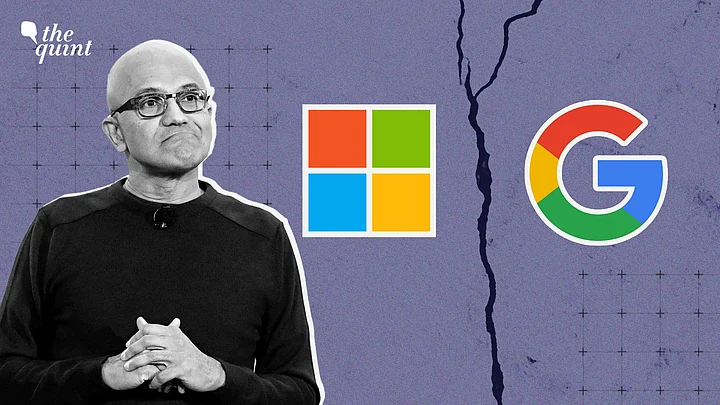As India remembered the Father of the Nation, Mahatma Gandhi, on 2 October this year, two technology giants – Microsoft and Google – headed by two successful people of Indian origin, were battling it out in federal court in Washington DC as part of the first antitrust trial in the internet era initiated by the United States Justice Department (against Google).
Satya Nadella, the CEO of Microsoft, testified quite vehemently against Google. The big tech business rivalry that was on display went beyond Nadella and Sundar Pichai's Indian bonhomie, premised on the ever-increasing tentacles of technology and its business dynamics.
While taming 'Big Tech’ (mostly Microsoft, Google, Meta, Apple, and Amazon) has been an issue in many geographies recently, this antitrust case is going to be keenly watched.
Gearing Up for the Big Tech Battle
We have already seen the European regulatory pursuits where several big tech companies have been tried in antitrust cases and heavily penalised.
But the US has woken up now. In the previous week, the Federal Trade Commission (FTC) sued Amazon, arguing that the latter broke antitrust laws by squeezing merchants on its site. The FTC has also filed an antitrust lawsuit against Meta, claiming that the latter smarted out of emerging rivals, and the US Justice Department has sued Google in a second case over the latter's control of online advertising.
However, the rivalry between Microsoft and Google is shaping up in a more shrill manner as artificial intelligence takes centre stage.
In the past, competition in various technology sectors ranging from office productivity software to cloud computing and mobile operating systems, has continued at a professionally accepted pitch, except in the search engine domain.
Search Competition Turned Microsoft, Google Into Rivals
Microsoft and Google have been competing in the search engine market for years. Google's search engine dominates the market but Microsoft's Bing has been working to gain market share. Both companies have been constantly enhancing their search algorithms and features to attract users. Yet in 2022, Google controlled 91 percent of the market and Bing had only three percent.
In the office productivity software market, Microsoft offers the popular Microsoft Office suite including software like Word, Excel, and PowerPoint while Google offers Google Workspace (previously G Suite) which includes Google Docs, Sheets, and Slides.
The competition has led to both companies introducing new features and improvements for their respective tools.
In the cloud computing domain, both Microsoft Azure and Google Cloud Platform (GCP) offer infrastructure and platform services to businesses and developers. With Amazon Web Services in the lead, this market too is highly competitive as organisations increasingly rely on cloud solutions for their computing needs.
Although Microsoft's Windows mobile operating system has largely faded from the market, its rivalry with Google's Android was notable for a while. Microsoft had also (unsuccessfully) attempted to gain market share with its own mobile devices, but Android ended up gaining widespread adoption.
What It Means for Regulators
These battles are nothing new. They revolve around various issues such as antitrust concerns, data privacy, market dominance, and competition. But the fact that regulators have opened the canvas of these fights is interesting because of two reasons:
Firstly, it gives a wider opportunity for the regulators to understand the intricacies of the products and solutions in the market and how they are marketed towards balanced or dominant positions
Secondly, it emphasises the need to harmonise a level playing field or market-related approach to tech offerings.
While consumer interest will be the prime concern for regulators, the consumer preference and business deals will be the guiding point for businesses and partners.
Apple and Samsung have preferred the Google search engine over Bing, and Microsoft seeking a regulatory stamp to enter a late and lost battle might be a poor approach unless it improves and competes. It still might be tough to arrive at a common ground and for business interests to converge.
Meanwhile, the AI battle has just started. Microsoft's investments in ChatGPT-parent Open AI might not be the farthest leap that it could have taken as Google's Bard and other AI players are catching up fast.
AI in the Mix
As the possibilities of and fears around AI gather more public and regulatory attention, there is much at stake for big tech players.
With high-performance computing carrying AI to more demanding levels, regulatory arrangements need to be bolstered at national levels while also fostering a global regulatory regime. The United Nations is already talking about playing such a role, but there might be a long way to go for that.
For now, American regulators have gotten busy and will hopefully keep pace with their European counterparts in terms of consistency and stringency.
Unless the tech giants are tempered on responsibility and turf balance, the digital space will get more and more chaotic.
Thus, the very purpose of keeping the medium of the internet free would be challenged. Meanwhile, the hearings for ten weeks will open up many issues that will throw a lot of glare on how tech giants conduct business. The final judgment will be a landmark one either way.
(Subimal Bhattacharjee is Visiting Fellow Ostrom Workshop Indiana University Bloomington USA and a cybersecurity specialist. This is an opinion piece. The views expressed above are the author’s own. The Quint neither endorses nor is responsible for them.)
(At The Quint, we question everything. Play an active role in shaping our journalism by becoming a member today.)
